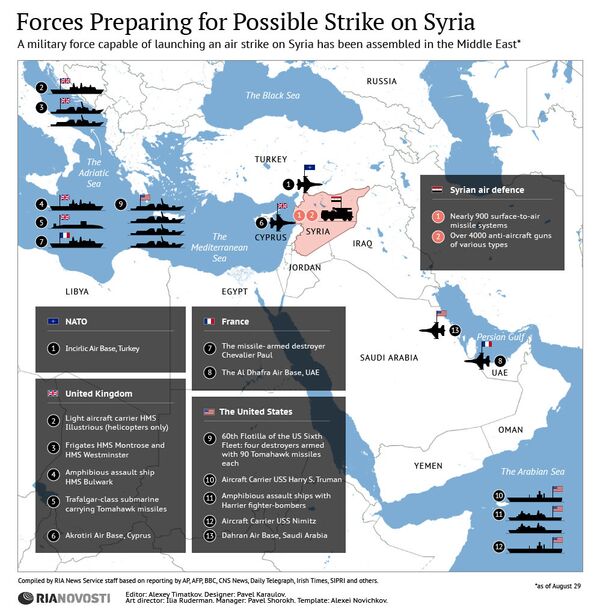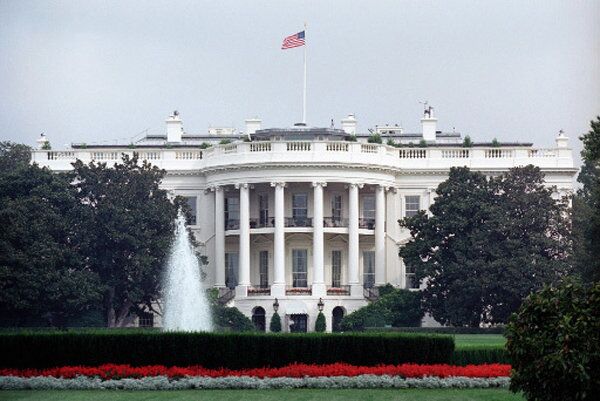WASHINGTON, August 29 (RIA Novosti) – An urgent meeting of the five permanent members of the United Nations Security Council – reportedly called by Russia – ended in less than an hour on Thursday without any indication of progress or agreement on the crisis in Syria following last week’s alleged chemical weapons attack, US media reported.
It was the second time in two days that the five permanent Security Council members – the United States, Russia, Britain, France and China – came out of a meeting with no apparent progress.
Russia, which on Wednesday blocked a British resolution seeking the authorization of military force, says there is no evidence that the government of Syrian President Bashar Assad was responsible for the chemical weapons attack. The US and its allies say they are convinced that the Assad regime was behind the attack.
And in a stunning defeat for British Prime Minister David Cameron, the British parliament late Thursday voted against endorsing military action against Syria.
The White House said Thursday’s Security Council permanent member meeting was the latest effort by Moscow to prevent the UN from holding Syria accountable for the alleged use of chemical weapons near Damascus on Aug. 21. The Syrian government has denied using chemical agents.
The United States believes “strongly” in the UN process, but, “What we’ve seen at the UN is a repeated willingness on the part of the Russians to block action… They’ve done it three times, looks like they’re doing it again,” said White House deputy press secretary Josh Earnest in a briefing with reporters.
The United Nations Security Council has not authorized any military intervention in the Syrian crisis, which began in early 2011. Moscow, along with Beijing, has previously vetoed three UN Security Council resolutions condemning Assad's government
“We’ve seen two years of Russian intransigence on the Syria issue at the UN... We’ve haven’t seen a shift in two years, I’m not sure why we would expect one today,” said Marie Harf, State Department spokeswoman, to the media.
More than 350 people, many of them women and children, died in the chemical weapons attack, according to the Syrian opposition and the international medical humanitarian organization Doctors Without Borders.
With UN approval, US President Barack Obama will “make a decision about an appropriate response based on the national security interests of the United States of America,” which takes into account that Syria is perhaps the most volatile country in one of the most volatile regions of the world, Earnest said.
“This country borders a NATO ally in Turkey, it borders one of our most important partners in the region, Jordan, and it is in close proximity to the nation of Israel, a country whose security we have vowed to protect… so there are a number of ways in which the national security interests of United States are at stake here,” he added.
On Thursday, the White House appeared to be broadening its efforts to build a consensus with US lawmakers for action against Syria with an unclassified phone briefing between senior administration officials, including Secretary of State John Kerry, and leaders of Congress from both political parties.
Two leading members of the US Senate intelligence committee who had seen a classified assessment of the attack said on Thursday that they believe the Assad regime was responsible.
“I have been briefed by the intelligence community on last week’s chemical weapons attack in Syria and I believe the intelligence points to an attack by the Assad government, not the opposition,” said Sen. Dianne Feinstein, the chairwoman of the intelligence committee, in a statement.
“Based on available intelligence, there can be no doubt the Assad regime is responsible for using chemical weapons on the Syrian people,” Sen. Saxby Chambliss, vice chairman of the same committee, said in a statement.
“It is time for the United States to act in a serious way, and send a clear message to Assad and his allies that the world will not tolerate chemical or biological attacks. Continuing to do nothing is not an option,” he added.
But 116 House lawmakers sent a letter to Obama Wednesday requesting consultation with and authorization from Congress before he orders US military force against Syria.
In a separate letter, House Speaker John Boehner also wrote to the president saying it is “essential that you provide a clear, unambiguous explanation of how military action… will secure US objectives and how it fits into your overall policy.”
Boehner further called on Obama to make the case to the American people for how such action “will secure American national security interests, preserve America's credibility, deter the future use of chemical weapons.”
White House spokesman Earnest said while Obama believes it is important for his administration to consult with Congress about Syria “in a very robust way,” he also feels there is a limited timeframe in which to decide on the best course of action.
“It is important for the Assad regime and other totalitarian dictators around the globe to understand that the international community will not tolerate the indiscriminate, widespread use of chemical weapons, particularly against women and children as they’re sleeping in their beds,” he said.



